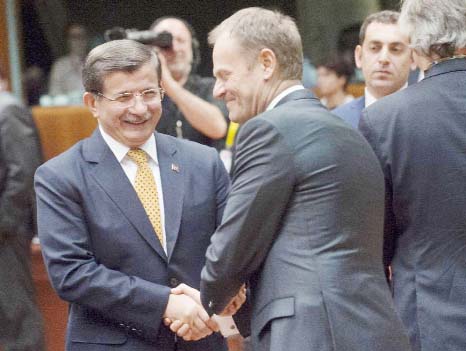
Reuters, Brussels :
European Union leaders concluded a controversial deal with Turkey on Friday intended to halt flow of illegal migrants to Europe in return for financial and political rewards for Ankara.
The accord aims to close the main route over which a million migrants and refugees poured across the Aegean Sea to Greece before marching north to Germany and Sweden in the last year. But deep doubts remain about whether the deal is legal or workable.
After a morning of talks with Turkish Prime Minister Ahmet Davutoglu, European Council President Donald Tusk recommended that the 28 EU member states approve the text without changes and they rapidly agreed to do so at a summit lunch in Brussels. Ankara wins pledges for money, early visa-free travel and progress in its talks for EU membership
“Agreement with Turkey approved. All illegal migrants who arrive to Greece from Turkey starting March 20 will be returned,” Czech Prime Minister Bohuslav Sobotka tweeted, before Mr Tusk confirmed unanimous agreement between the EU and Turkey.
Under the pact, Ankara would take back all illegal migrants who cross to Greece, including Syrians, in return for the EU taking in thousands of Syrian refugees directly from Turkey and rewarding it with more money, early visa-free travel and progress in its EU membership negotiations.
Migrants who arrive in Greece from Sunday will be subject to being sent back to Turkey once they are registered and their asylum claim is processed. A senior Turkish official said the returns would begin on April 4 and resettlement of Syrian refugees in Europe would begin simultaneously.
The EU also agreed to accelerate disbursement of three billion euros already pledged in support for refugees in Turkey and to provide a further 3bn by 2018 once Ankara came up with a list of projects that qualified for EU assistance. Facing a backlash from anti-immigration activists across Europe, the EU is desperate to stem the influx but faced legal obstacles to blanket returns of migrants to Turkey.
The summit discussions exposed considerable doubts among member states and EU lawyers over whether a deal could be made legal under international law, and human rights groups denounced the planned agreement as a sell-out of European principles.
The EU leaders pressed Ankara to change its rules to extend international standards of protection to non-Syrian migrants, a condition for Greece to be able legally to return asylum seekers to Turkey.
European Union leaders concluded a controversial deal with Turkey on Friday intended to halt flow of illegal migrants to Europe in return for financial and political rewards for Ankara.
The accord aims to close the main route over which a million migrants and refugees poured across the Aegean Sea to Greece before marching north to Germany and Sweden in the last year. But deep doubts remain about whether the deal is legal or workable.
After a morning of talks with Turkish Prime Minister Ahmet Davutoglu, European Council President Donald Tusk recommended that the 28 EU member states approve the text without changes and they rapidly agreed to do so at a summit lunch in Brussels. Ankara wins pledges for money, early visa-free travel and progress in its talks for EU membership
“Agreement with Turkey approved. All illegal migrants who arrive to Greece from Turkey starting March 20 will be returned,” Czech Prime Minister Bohuslav Sobotka tweeted, before Mr Tusk confirmed unanimous agreement between the EU and Turkey.
Under the pact, Ankara would take back all illegal migrants who cross to Greece, including Syrians, in return for the EU taking in thousands of Syrian refugees directly from Turkey and rewarding it with more money, early visa-free travel and progress in its EU membership negotiations.
Migrants who arrive in Greece from Sunday will be subject to being sent back to Turkey once they are registered and their asylum claim is processed. A senior Turkish official said the returns would begin on April 4 and resettlement of Syrian refugees in Europe would begin simultaneously.
The EU also agreed to accelerate disbursement of three billion euros already pledged in support for refugees in Turkey and to provide a further 3bn by 2018 once Ankara came up with a list of projects that qualified for EU assistance. Facing a backlash from anti-immigration activists across Europe, the EU is desperate to stem the influx but faced legal obstacles to blanket returns of migrants to Turkey.
The summit discussions exposed considerable doubts among member states and EU lawyers over whether a deal could be made legal under international law, and human rights groups denounced the planned agreement as a sell-out of European principles.
The EU leaders pressed Ankara to change its rules to extend international standards of protection to non-Syrian migrants, a condition for Greece to be able legally to return asylum seekers to Turkey.

